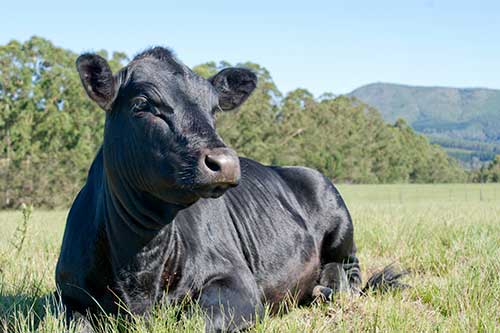What Vaccinations Do My Brood Cows Need?
Jul 01, 2019

Spring is an excellent time to work cattle, especially for the cow-calf producer. Ideally, brood cows should be worked prior to, but as close as possible to calving. It is especially important to be careful when working cows in late gestation. Work them slowly and gently. Don’t squeeze them too tightly in the squeeze chute.
There are two main goals when vaccinating brood cows: immunity for the cow against disease and production of high-quality colostrum for the newborn calf.
Cows and bulls should be vaccinated for the four most common respiratory viruses: bovine respiratory syncitial virus (BRSV), bovine viral diarrhea (BVD), infectious bovine rhinotracheitis (IBR), and parainfluenza (PI3). Cows and bulls should also be vaccinated for leptospirosis. Adult cows should also be vaccinated for blackleg with a seven-way clostridial vaccine. Many times, it’s a good idea to vaccinate pregnant cows with a rota-corona/E.coli vaccine before she gives birth to the calf. Here again, the primary aim is to produce colostrum rich in antibodies for these diseases.
Other vaccines that should be considered for brood cows, depending on individual needs, are for the diseases Haemophilus somnus, pinkeye, and vibriosis. Questions regarding these optional vaccines can often be answered by your local veterinarian or an animal health specialist at your Co-op.
When vaccinating cattle with any program, it’s extremely important to follow the manufacturer's instructions. If a particular vaccine indicates that it should be followed by a booster in three to four weeks, then boosters are necessary for the efficacy of the vaccine. Failure to follow instructions will often render the vaccines useless. While it is not often convenient, cows vaccinated four to six weeks prior to calving have the best chance of producing high-quality colostrum. Keep in mind that certain vaccines are safe for pregnant cows and some aren’t.
Your veterinarian and local Co-op animal health specialist can help determine a vaccination schedule and regimen that will provide the safest and best protection for your herd. Head to Co-op for your cattle care needs!
There are two main goals when vaccinating brood cows: immunity for the cow against disease and production of high-quality colostrum for the newborn calf.
Cows and bulls should be vaccinated for the four most common respiratory viruses: bovine respiratory syncitial virus (BRSV), bovine viral diarrhea (BVD), infectious bovine rhinotracheitis (IBR), and parainfluenza (PI3). Cows and bulls should also be vaccinated for leptospirosis. Adult cows should also be vaccinated for blackleg with a seven-way clostridial vaccine. Many times, it’s a good idea to vaccinate pregnant cows with a rota-corona/E.coli vaccine before she gives birth to the calf. Here again, the primary aim is to produce colostrum rich in antibodies for these diseases.
Other vaccines that should be considered for brood cows, depending on individual needs, are for the diseases Haemophilus somnus, pinkeye, and vibriosis. Questions regarding these optional vaccines can often be answered by your local veterinarian or an animal health specialist at your Co-op.
When vaccinating cattle with any program, it’s extremely important to follow the manufacturer's instructions. If a particular vaccine indicates that it should be followed by a booster in three to four weeks, then boosters are necessary for the efficacy of the vaccine. Failure to follow instructions will often render the vaccines useless. While it is not often convenient, cows vaccinated four to six weeks prior to calving have the best chance of producing high-quality colostrum. Keep in mind that certain vaccines are safe for pregnant cows and some aren’t.
Your veterinarian and local Co-op animal health specialist can help determine a vaccination schedule and regimen that will provide the safest and best protection for your herd. Head to Co-op for your cattle care needs!